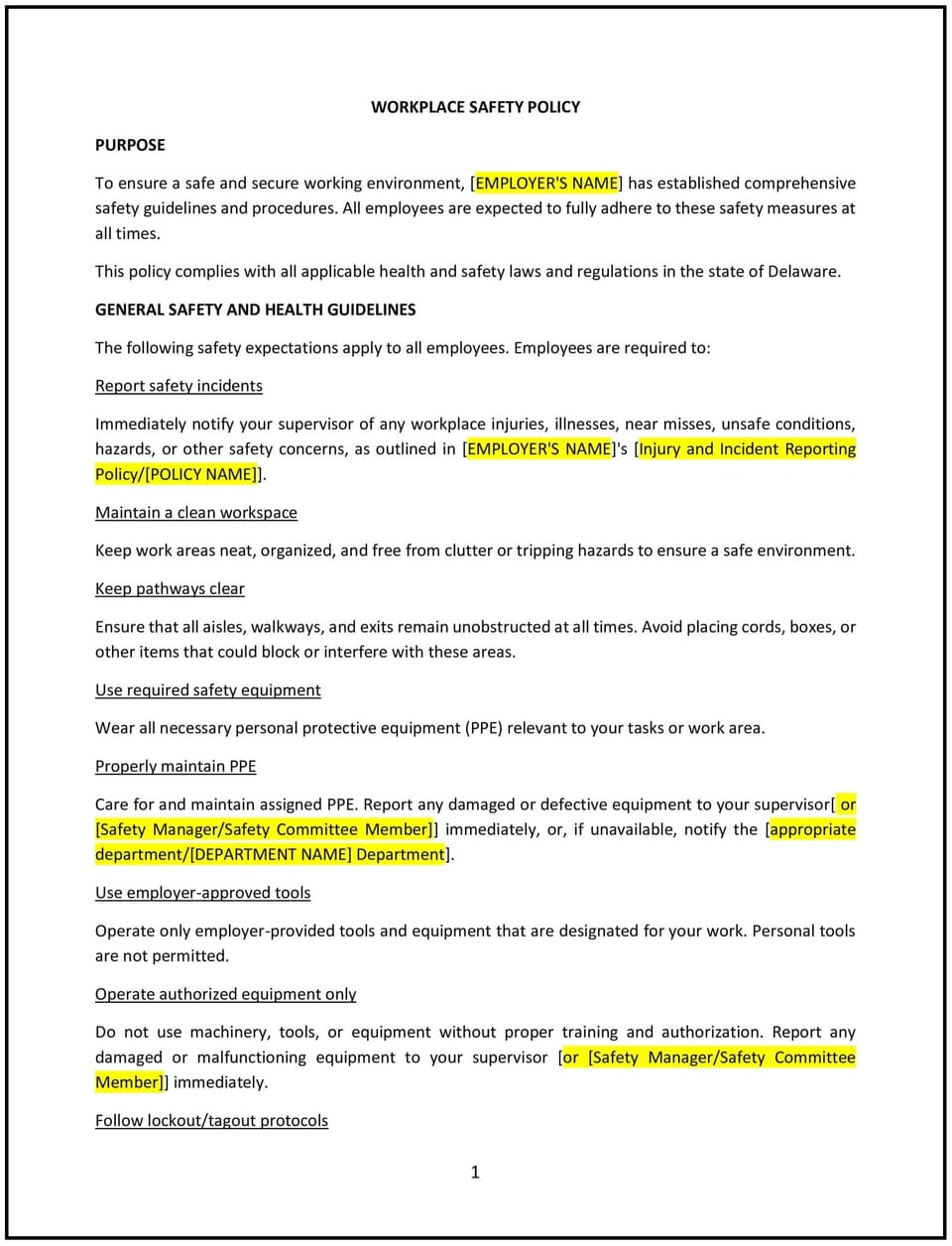Workplace safety policy (Delaware): Free template

Workplace safety policy (Delaware)
A workplace safety policy helps Delaware businesses create a secure and hazard-free environment by establishing clear safety guidelines, preventive measures, and incident response procedures. This policy ensures compliance with Delaware and federal safety regulations, such as OSHA standards, and supports employee well-being and operational efficiency.
By implementing this policy, businesses can reduce risks, protect employees, and promote a culture of safety.
How to use this workplace safety policy (Delaware)
- Define safety responsibilities: Clearly outline roles and responsibilities for employees, managers, and supervisors in maintaining workplace safety.
- Identify hazards: Include procedures for identifying, reporting, and mitigating workplace hazards, such as unsafe equipment or environmental risks.
- Provide training: Ensure employees receive regular safety training tailored to their roles, including emergency procedures and the proper use of equipment.
- Establish reporting protocols: Detail how employees should report safety concerns, incidents, or near misses, including timelines and required documentation.
- Include emergency response plans: Outline procedures for evacuations, medical emergencies, and other critical incidents to ensure swift and effective action.
- Monitor compliance: Conduct regular inspections and audits to ensure adherence to safety protocols and legal requirements.
Benefits of using this workplace safety policy (Delaware)
This policy offers several benefits for Delaware businesses:
- Promotes employee well-being: Reduces risks of injuries or illnesses, creating a safer and more productive work environment.
- Ensures legal compliance: Aligns with Delaware and federal safety regulations, minimizing the risk of fines or legal disputes.
- Enhances workplace culture: Fosters a culture of accountability and safety awareness among employees and management.
- Reduces operational disruptions: Minimizes downtime caused by accidents or unsafe conditions.
- Supports risk management: Provides a structured approach to identifying and addressing workplace hazards proactively.
Tips for using this workplace safety policy (Delaware)
- Communicate the policy clearly: Ensure employees understand safety expectations, reporting procedures, and their responsibilities.
- Provide regular training: Offer ongoing education on safety protocols, hazard identification, and emergency response procedures.
- Conduct safety audits: Perform regular workplace inspections to identify and address risks before incidents occur.
- Encourage employee involvement: Foster a culture where employees feel comfortable reporting safety concerns and participating in improvement efforts.
- Update regularly: Revise the policy as needed to reflect changes in Delaware laws, workplace conditions, or industry standards.
Q: Why is a workplace safety policy important for my business?
A: This policy ensures compliance with safety regulations, protects employees, reduces risks, and promotes a culture of accountability and well-being.
Q: How can employees report safety concerns or incidents?
A: Employees should follow the outlined reporting procedures, which may include notifying a supervisor, completing an incident report, or using an anonymous reporting system.
Q: What types of safety training should businesses provide?
A: Training should cover emergency procedures, hazard identification, proper equipment use, and role-specific safety protocols.
Q: How does this policy help prevent workplace accidents?
A: The policy emphasizes hazard identification, preventive measures, regular training, and clear reporting protocols to address risks proactively.
Q: How often should this policy be reviewed?
A: This policy should be reviewed annually or whenever Delaware safety laws, workplace conditions, or industry standards change.
This article contains general legal information and does not contain legal advice. Cobrief is not a law firm or a substitute for an attorney or law firm. The law is complex and changes often. For legal advice, please ask a lawyer.


